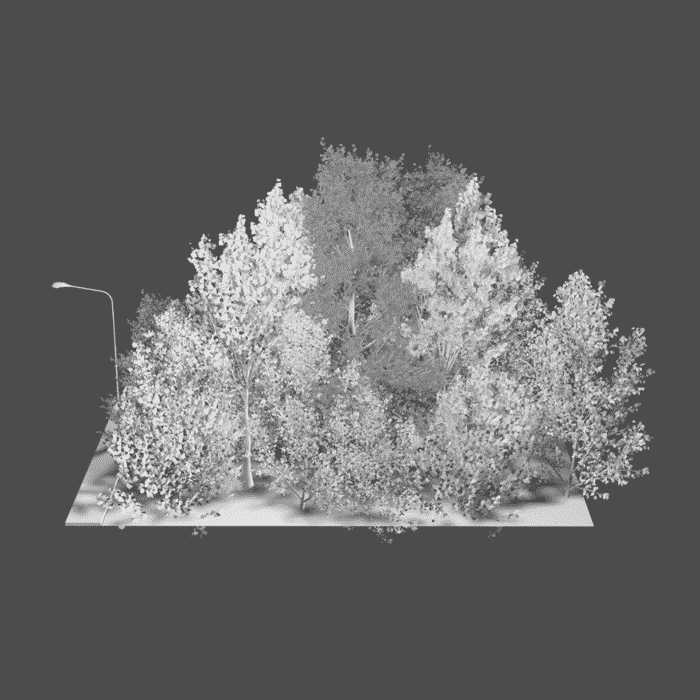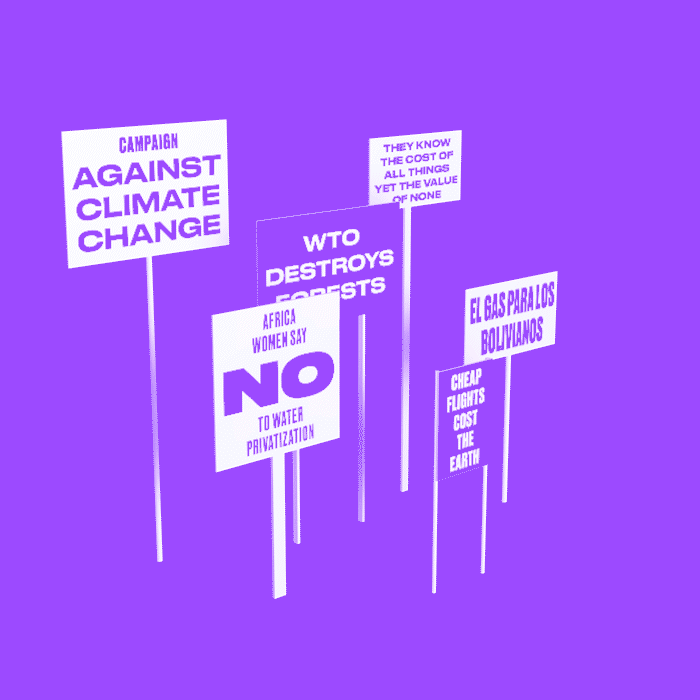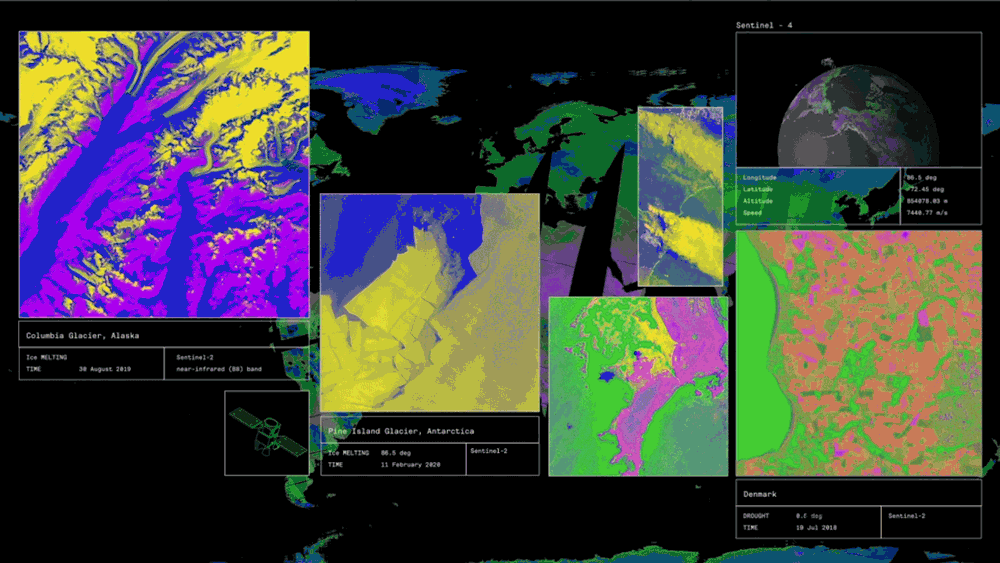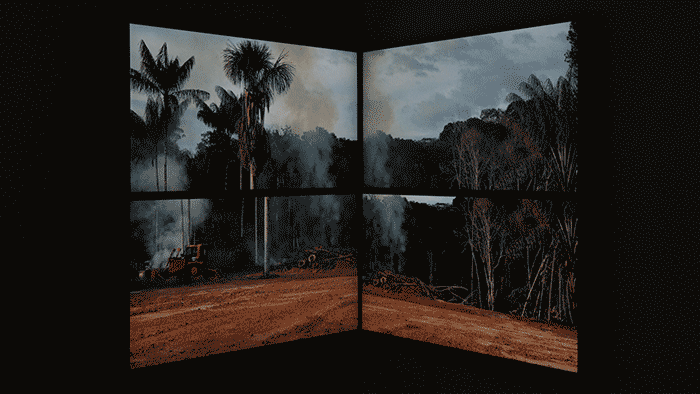Visual Natures 3/3
by Beatrice Leanza
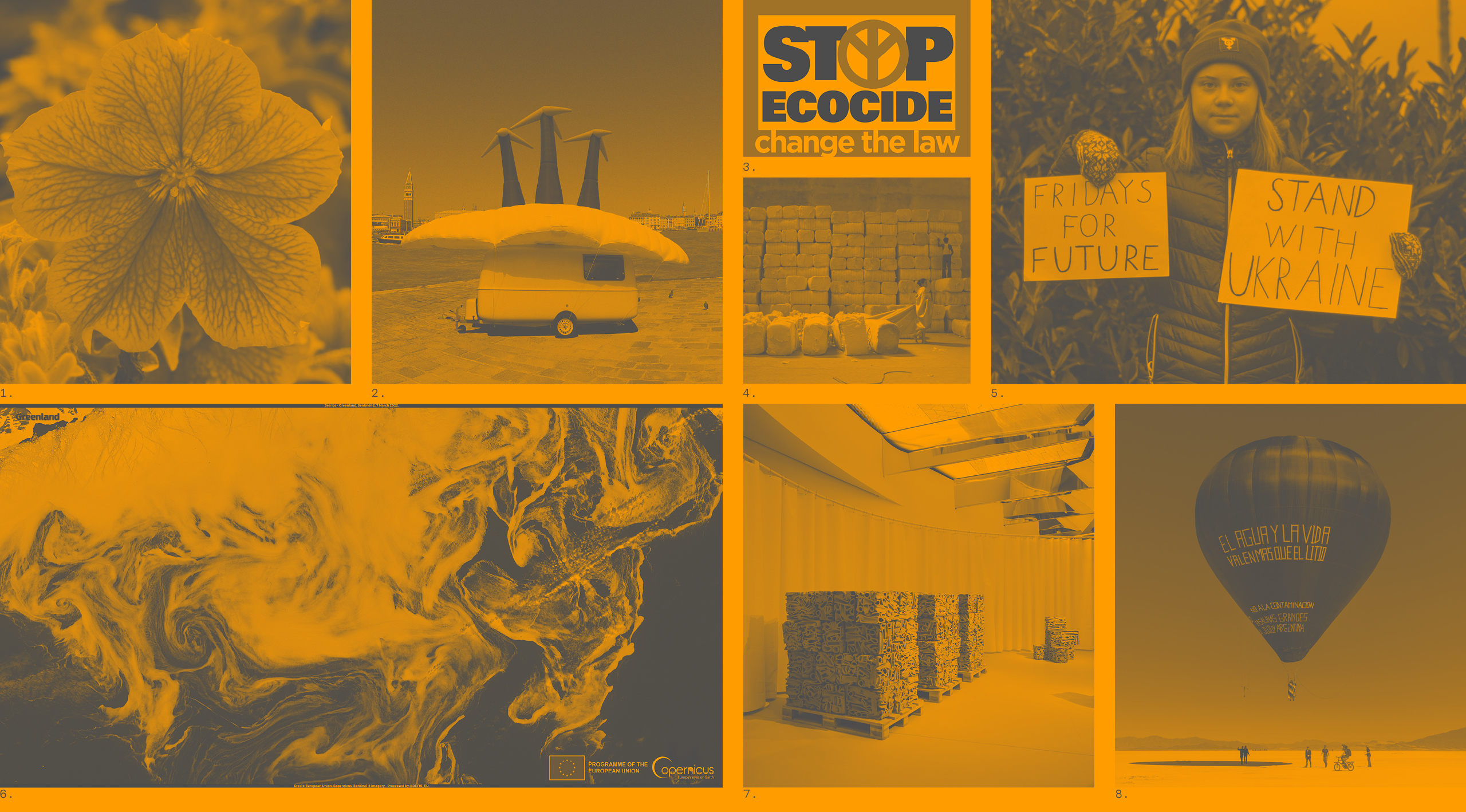
1. Eduardo Kac, "History of the Enigma: Plantimal I", 2009. Courtesy of the artist.
2. Søren Dahlgaard, "The Maldives Exodus Caravan Show", Venice Biennale, 2013. © Søren Dahlgaard.
3. “Stop Ecocide: Change the Law”, Stop Ecocide International.
4. Unknown Fields, "Unravelled", 2017. Courtesy: Liam Young and Kate Davies, Unknown Fields Division.
5. Greta Thunberg, “Fridays For Future”, 2022.
6. Sea ice extending between Greenland and Iceland. Photo: Copernicus Sentinel-2 (07/03/2022).
7. Superflex, exhibition Aquaria – Or the Illusion of a Boxed Sea, maat, 2021. Photo: Bruno Lopes.
8. Tomás Saraceno, "Aerocene", 2020-ongoing. aerocene.org
The latest IPCC Assessment Report was published in early March 2022. For the first time in its history, it made explicit reference to “equity and justice” as central in political decision-making to ensure Earth’s future – climate change evidently abates most virulently on the livelihoods of vulnerable populations, of already impoverished and underserved communities where the lack of quality infrastructure and technological support compound global warming problems. A clarion call for a rapid response planning in face of the fast-deteriorating quality of both the natural environment and human physical and mental health, the report alerts on the critical need for an urgent adaptive strategy to be put in place, one that harnesses nature by learning from it, reintegrates it in our living environs and restores while preserving biodiversity.
Many non-western societies have a wealth of knowledge accumulated in an understanding of the natural world that radically distances itself form the anthropocentric dogma of Cartesian thinking, and rather favours a conception of the relationships between societies and the biosphere coalesced around what Brazilian anthropologist Eduardo Viveiros de Castro has articulated in the theory of “perspectivism”, according to which different species experience and see different worlds. Otherwise known as “multinaturalism”, it refers to recurrent characteristics found in Amerindian mythology and cosmology, revealing a particular configuration of distinctions between humans and nonhumans that are irreducible to Western dichotomies of nature/culture. In these ecologies, identity relations among living beings and their habitat are not predicated on objectifying processes of evolutionary hierarchy, but lived and experienced as networked and transformational, where non-human actors too are considered as “persons”, thus giving them consciousness and intentionality (Philippe Descola, “Ecology as Cosmological Analysis”, 2005). Indigenous peoples’ relationship to the land is also one that has historically been abused by extractive neoliberal capital and its colonial progeny, to the detriment of populations dispossessed not only of their territory but their collective heritage as well – dilapidations that endure today in communities sited around resource-rich areas like the tar sands in Canada or the forests in Indonesia and Malesia.
Multinaturalism fuses ecological, political, and cultural perspectives together, addressing longer term goals of planetary politics where ecological and social justice are coterminous, a notion that in most recent years has surfaced in intersectional cultural discourse world-wide, invigorated by decolonizing and queer theories in various academic fields and practices, from architecture and urbanism to music and mainstream cinema. The language and methodologies of cross-disciplinary creative collaboration and co-action emerging over the past two decades collate forms of specialised knowledge that span from geological and marine studies, astrophysics, computational modelling and data science to biomimicry and material engineering, thus exponentially expanding the conceptual bounds and cognitive understanding of life on Earth as well as the speculative and practical possibilities of envisioning a pro-universalist future integrating human as well as extra-human agents like nature and machines.
New intergovernmental deliberations like the signing of the Paris Agreement by 196 countries in 2016, and the legislative adoption of the European Climate Law in 2021, are positive signs of progress, but the reality of climate futures lies in scenarios of planetary governance that will have to abandon principles of growth and accumulation on which many of the reticent powers still count, in favour of more adaptive and efficient uses and distribution of resources in accordance with nature’s capacity to regenerate itself. Many of the research-lead creative practices active today occupy this flexible territory where speculative simulations integrating advanced technologies, scientific knowledge and storytelling can help us gauge the possibility of a post-capitalist future.
Environmental concerns and ecological praxis certainly constitute a central dilemma of our era, but they also represent a point of convergence for the politics and culture of the 21st century to mobilise human agency towards an ethical and moral reckoning of unprecedented scale.
Augmented Nature and Terraforming
From the genetic modification of molecular structures to practices of geoengineering, i.e. weather modification like solar radiation, and the logistical automations that fill operational landscapes of transport networks, pipelines, cryptocurrency mining or shipping routes, human control over the living environment extends across scales that encompass biological, chemical, and geological domains.
Since the late 1990s and more intensively from the beginning of the new millennium, the spectrum of theoretical and practice-based investigations around more-than-human ecologies has broadened vastly. This has informed, among others, epistemologies and ontologies engendered by other-than-human agents including bacteria, fungi, minerals, microorganism, so at large biological entanglements that animate visions of an augmented world where individuality – human, animal, or otherwise – is predicated on a host of reciprocal interactions among its microbial components, a notion popularised by the evolutionary biologist Lynn Margulis in the 1990s through the concept of the ‘holobiont’.
This view is energised by adjacent gender and queer theories, ecofeminism, and in general critical studies interested in reconfiguring human narratives into constructs of planetareity informed by geotechnologies, geoeconomines and geopolitics that operate on wider physical and temporal scales, from engineering life on Earth to terraforming Mars.
The contemporary politics of climate reparation is debated in the interstitial territory between regulatory and developmental processes of monitoring and surveillance – of satellites, space probes and artificial intelligence as part of an augmented infrastructure of bio-technological survival.
Post-anthropocentric cultural perspectives have in this sense increasingly focused on Earth-shaping processes (i.e. terraformation) bringing forward new approaches that range from looking at automation as “a general principle by which ecosystems work” (The Terraforming Project, 2020-2022), preserving vernacular and indigenous forms of knowledge predicated on nature-based technologies of sustenance, to a reassessment of inter-species coexistence identifying novel entanglements within wet-worlds, forests and marine ecosystems where world-making processes are observed in both human and non-human agency (see for example edited readers like Feral Atlas – The More-Than-Human Anthropocene, 2020; More-than-Human, 2020; Arts of Living in a Damaged Planet, 2017), thus including speculative philosophies of post-materialism and object-oriented ontology.
The civic and social intensification of climate mobilisation over recent years, as well as the generational and geographical expanse of its actions (Extinction Rebellion, #FridaysForFuture among others), pays testament to the pressing need of addressing issues of gender-responsive climate policies, climate migration and poverty as part of a critical effort to secure a stable and equitable future for world populations (see the new Sustainable Development Goals, 2015).
Speculative Ecologies and Post-Globalisation
In June 2021 an independent panel assembled by the NGO Stop Ecocide International and lead by an international group of activists and legal experts signed off a ground-breaking achievement: it drew up the legal definition of “ecocide” to recognize long-term damages perpetuated against the environment as a criminal offence on par with war crimes, crimes against humanity, genocide and the crime of aggression that are currently prosecuted by the International Criminal Court.
As mass demonstrations against discrimination and structural racism gained world-wide momentum with the emergence of movements like BlackLivesMatter, the social and economic ramifications of environmental despair found resonance across intellectual and civic networks that commonly seek to protect the rights of the most vulnerable, including LGTBQ+ and POC groups.
Also among artistic and cultural circles have the tools and expressions of eco-critical activism multiplied in terms of outreach and methodologies, often leaning on long-term processes of sustained collaboration driven by investigative inquiries of scientific rigour – examples of which are collective endeavours that focus on the complex geographical and geopolitical entanglements of social justice, ecological destruction, corporate and political machinations in a post-global world.
Among these are the explorations around materials and extractive ecosystems by the World of Matter group, the para-legal practice of Forensic Architecture, the pedagogical programmes of Decolonizing Architecture Art Research in Palestine, or the Karrabing Film Collective active in the Aboriginal Northern Territory of Australia. Institutional cultural agendas have also significantly devoted attention to the widening geographies and disciplinary diversification of strategies of ecological reparation (the XXII Triennale di Milano. Broken Nature – Design Takes on Human Survival, 2019; the 1st Sharjah Architecture Triennial. Rights of Future Generations, 2019; the Cooper Hewitt Design Triennal. Nature, 2019; the 13th Shanghai Biennale. Bodies of Water, 2021).
The speculative turn referred to here underlines a distinctive trait of contemporary creative agency that deploys narratives, technologies and in general world-building tools as diverse as gaming and interaction design, collaborative farming and gardening in designing actionable scenarios of care and mitigation of anthropogenic climate change on expansive physical and temporal blueprints of transformation.
If the material reality of post-global politics draws up a world of deepening divisionism arbitered by stricter rules of access and restriction to resources and information, it is in the justice-lead movement of the current ecological paradigm that we might discover novel routes of planetary empowerment and inhabitation.
Visual Natures (maat, 30/03 – 05/09/2022) is the product of more than two years of critical investigations around climate science, creative practices and eco-politics. A continuation of the data-driven installation Earth Bits – Sensing the Planetary and the public programme Climate Emergency > Emergence, both conceived and ignited by Beatrice Leanza during her directorship of the museum, the project surveys political, social and cultural forms of collective agency from the 1950s onwards that demonstrate how our understanding of “nature” informs the ways in which we organise, sustain and govern our communities as an expanding planetary construct, in concept and in practice.
On maat ext., the series #groundworks introduce the critical explorations that feed into the complex interconnectivity between the environmental and energetic quests and its reverberation through decades of artistic creation and cultural dynamics, traced from the 1950s until today, and continues these investigations through collaborations with artists, curators, archivists, researchers and activists on their work and the meanings of ecology, environmentalism and societal responsibilities in the face of climate change.
Explorations is a programme framework (maat, 2020–2022) featuring a series of exhibitions, public and educational projects delving into the multi-faceted subject of environmental transformation from various scholarly and experimental vantage points – it brings philosophical and political perspectives forward, as well as sociocultural and technological investigations interwoven in speculative and critical practices in the arts and design at large. Central to this discursive and critical effort was the establishment of the maat Climate Collective in 2021, chaired by T. J. Demos, and geared toward assembling diverse cultural practitioners working at the intersection of experimental arts and political ecology.


